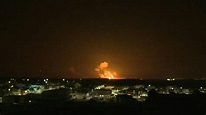Featured
article
- Get link
- X
- Other Apps
Oil Prices Plummet as Iran Targets U.S. Military Bases, Spares Energy Infrastructure

Oil markets experienced a sharp downturn on Monday after Iran launched missile strikes on U.S. military bases in Qatar in retaliation for recent American attacks on Iranian nuclear facilities. Despite initial fears of a broader conflict, the strikes notably avoided energy infrastructure, easing concerns of immediate supply disruptions.
West Texas Intermediate crude fell over 7%, dipping below $70 per barrel, while Brent crude dropped nearly 4% to around $72. Analysts attributed the plunge to the perception that Iran’s response was calibrated to avoid escalating tensions further, particularly by not targeting oil production or export routes like the Strait of Hormuz.
The restraint shown by Iran, coupled with no reported casualties or damage to U.S. assets, led markets to believe that a wider conflict—and the resulting energy shock—might be averted for now. However, geopolitical risk remains elevated, with energy analysts warning that any future escalation involving key oil infrastructure could send prices soaring into triple digits.
As the situation develops, traders and policymakers alike are watching closely for signs of further retaliation or diplomatic de-escalation.
Popular Posts
Trump's Six Words: "I'm Going to Stop the Wars"
- Get link
- X
- Other Apps
Midnight Blast Shakes Gaza Skyline Amid Rising Tensions
- Get link
- X
- Other Apps



Comments
Post a Comment